Cravath’s London Office Moves to 100 Cheapside
Meet Us
You will find that our lawyers are universally smart, interesting, motivated and professional—yet remarkably different from one another.
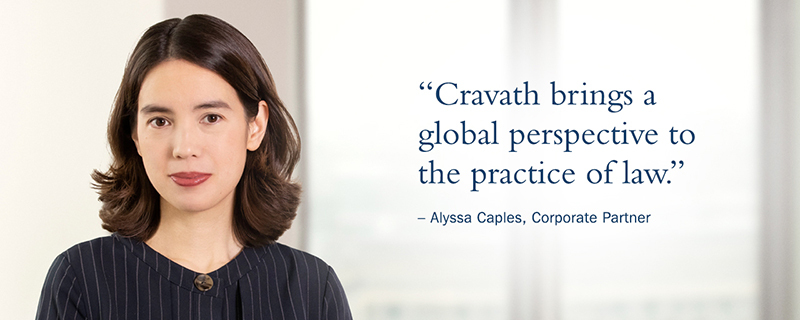
“Growing up in Canada and speaking French and Mandarin, I set out to find a firm with a global practice. The breadth of Cravath’s Corporate Department was really important to me. I knew that I would be working on cutting-edge matters not just in the United States, but also all over the world. But the strong work experience I knew that I’d get at Cravath was only half of the picture. I was also looking for a firm with a positive and collaborative work environment. Admittedly, I wasn’t sure I’d find it at Cravath, but was pleasantly surprised. Because an associate’s work is assigned by the partners in his or her group, the partners have a keen interest in training their associates. Plus, there’s no competition among associates for the high-profile deals and all attorneys are more than willing to share their knowledge with you. People at the Firm are serious about their work, but are always helpful and friendly. Indeed, some of my closest friends are people I first met at Cravath.
“Although I knew that I wanted to be a corporate lawyer, as a new law school graduate I had no idea which discipline within corporate practice suited me best, and I didn’t want to be pigeon-holed into one corporate practice area so early in my career. Fortunately, Cravath’s rotation system never made me choose.”
- Alyssa Caples, Corporate Partner
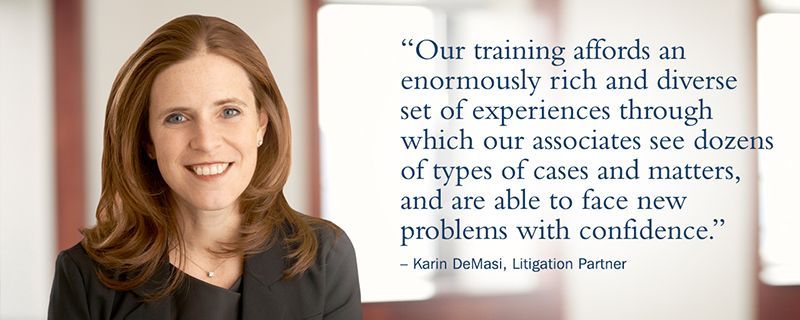
As Managing Partner for the Litigation Department, one of my responsibilities is to oversee the professional development of our associates. Litigation associates rotate every 18 to 24 months, and I speak with each associate individually to decide next steps in their professional development.
I spend a lot of time asking them: “What haven’t you done yet? What do you still need to learn?” Those conversations inform the next rotation, and we spend a lot of time thoughtfully charting each associate’s path.
In addition to that planning, the Firm uses a regular feedback system in which associates are reviewed annually, including both a self-assessment as well as a traditional review from the partner. Many meaningful discussions come out of those reviews—we discuss an associate’s career goals and talk about how the rotation system can round out an associate’s development, such as providing deposition or argument experience, or directing an associate to a particular area or type of case that fulfills their aspirations.
The rotation system provides every lawyer at Cravath with rigorous training tailored for them. As an associate, you are not one of a hundred trying to get noticed. You are an important addition to a team, a case, a client. You have a relationship with the partner and the team that you work with, and those natural mentorships continue throughout your career.
The rotation system is central to Cravath; it is a core value of the Firm. Our training affords an enormously rich and diverse set of experiences through which our associates see dozens of types of cases and matters, and are able to face new problems with confidence. Being excellent in any matter, no matter the area, is what makes our generalist lawyers succeed.
- Karin DeMasi, Litigation Partner
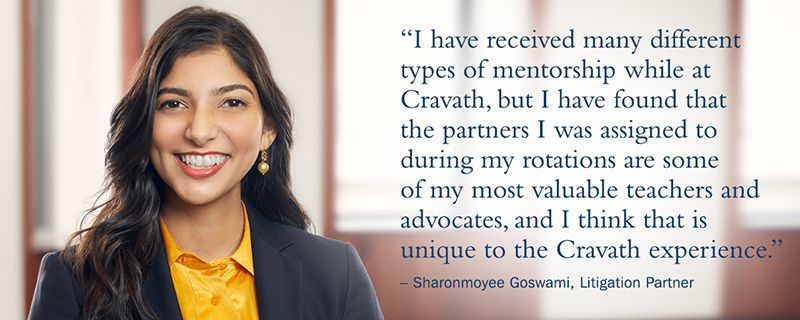
"I studied chemical engineering as an undergraduate and always had an interest in going to law school. I knew that I wanted to do something related to intellectual property and patent law, so when I was looking at firms, a big question for me was whether I wanted to go somewhere I would not exclusively be doing IP work versus going to an IP boutique.
I came here because, even with my interest in patent law, I wanted to learn the best way to litigate any sort of case. Cravath, with its rotation system and emphasis on generalist lawyers, seemed to be the best place to do that. As an associate, you meet regularly with the managing partner for the department, who has a big role in shaping your rotations. There is a give and take between you and the managing partner, with the question being, “What kind of experiences have you had so far, and what do you need to work on?”
So Cravath is really special in the sense that your rotation history will not always look like someone else’s because it reflects your own specific interests and experiences."
- Sharonmoyee Goswami, Litigation Partner
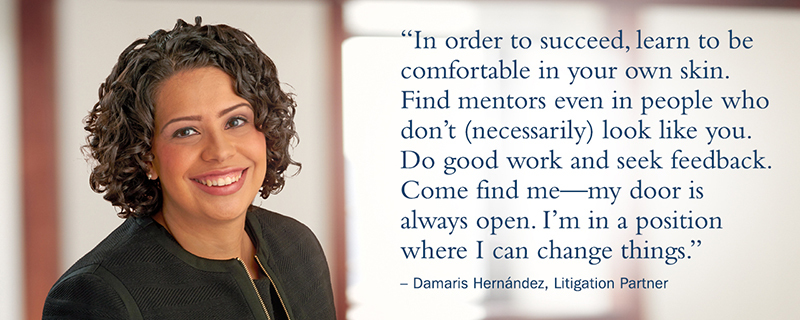
“I grew up working after school in my parents’ bodega in Brooklyn—they moved to New York from Puerto Rico with a grade-school education and taught me that hard work paid off. When I was in the 7th grade, a teacher saw something in me and helped me apply to Trinity High School in Manhattan and I was accepted. The hour-and-a-half ride to school took me to a completely different world.
“After high school, I went to Harvard and became the first person in my family to go to college. Later, I received an AnBryce scholarship that enabled me to attend the New York University School of Law. At law school, Cravath was described to me as a ‘white shoe’ firm. I had to Google that, and then thought, ‘Wait, that’s nothing like me!’ After spending my summer at Cravath, I realized it was the best place to start my career. The rotation system allowed me to get a lot of experience early on. The partners were invested in my professional development and my many wonderful Cravath mentors gave me the confidence and tools to believe in my own success. They took an interest not only in my career, but also my overall well-being, sanity and happiness.”
- Damaris Hernández, Litigation Partner
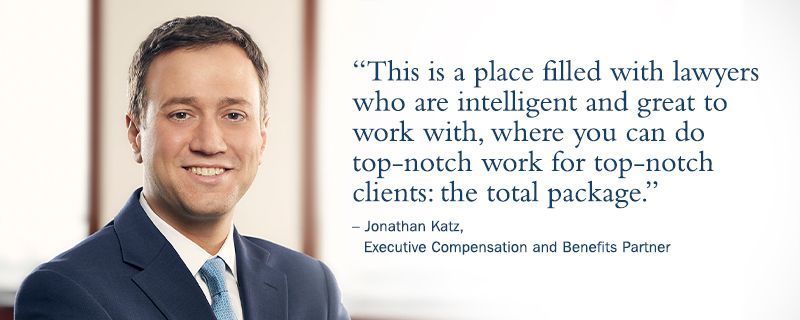
"I was drawn to Cravath by the focus on talent development and the Firm’s emphasis on training well‑rounded lawyers who can handle anything asked of them. I actually first started at the Firm as a legal assistant after college, working in a mergers and acquisitions group. Then, when I returned as a summer associate, I split my time between the tax and finance practices. When I came back after law school, I worked in the tax group for five years before ultimately switching tracks to executive compensation and benefits. Spending time in different roles and practices has allowed me to see the Firm and our clients through many different lenses.
While Cravath has a great formal training program through the rotation system and CLE offerings, the aspect of our training and mentorship model that I found most meaningful was the ability to see how the partners and senior attorneys approached matters—how they handled themselves with clients and in high-pressure situations. The in-person observation and learning opportunities I was presented with also really highlighted the sense of collegiality on which the Firm prides itself. I’ve never been afraid to ask questions or lean on someone else’s expertise. This is a place filled with lawyers who are intelligent and great to work with, where you can do top-notch work for top-notch clients: the total package. You can probably find all those individual pieces elsewhere, but it is all true in one place here."
- Jonathan Katz, Executive Compensation and Benefits Partner
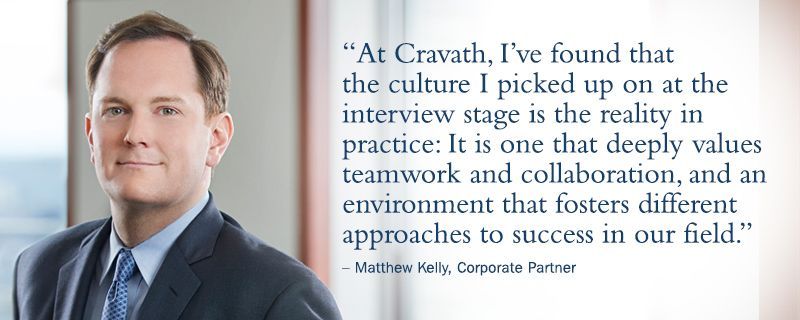
"I came to Cravath unsure whether I wanted to become a corporate lawyer or a litigator. I was attracted by the Firm’s documented strengths in a variety of practice areas and by the Cravath training system, which I understood to be unique in its focus on producing well‑rounded lawyers.
I was an older law student: I had worked in the Mayor’s Office in New York for four years after college and assumed I would return to working for the city in some capacity after graduating from NYU Law. But that changed during the interview process for a summer position, and particularly after meeting so many wonderful people at Cravath. I was drawn to the strong culture of teamwork and noted the variety of people and personalities I met at the Firm, each of whom I left thinking I’d be happy to work with.
At Cravath, I’ve found that the culture I picked up on at the interview stage is the reality in practice: it is a culture that deeply values teamwork and collaboration, and an environment that fosters different approaches to success in our field. There is no stereotypical “Cravath type.” In terms of both personality and style, our attorneys represent a wide spectrum: some are introverted, some extroverted; some are technical‑minded, and others more focused on the big picture. This is something I really value and that contributes to the fabric and success of the Firm. You can find your own path with your work here in a way that suits you best, without worrying about whether you fit a particular mold. I’ve found that to be true as both an associate and at the partner level—you are encouraged to develop into the type of lawyer that best fits you.”
- Matthew Kelly, Corporate Partner
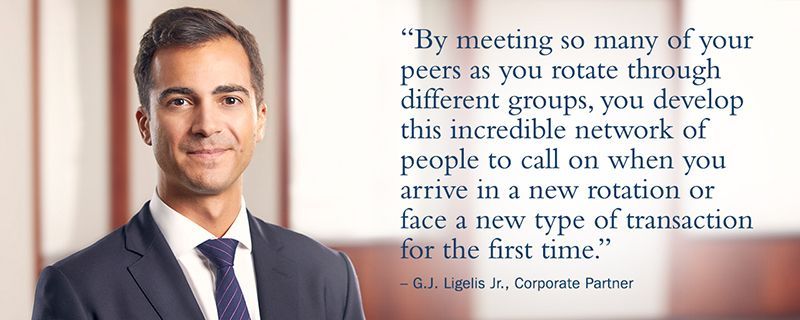
"I was actually a rare case of a student entering law school with the goal of becoming a corporate lawyer. After a friend turned me on to reading The Wall Street Journal toward the end of college, I found myself gravitating toward coverage of the big M&A deals at the time—both for the negotiating tactics used by the companies and their advisors as well as the strategic rationale driving the decision makers. And thanks to my mother’s career path as a corporate lawyer and then investment banker, I had a better sense of what transactional work was like.
That background interest allowed me to really focus my studies in law school on corporate law—ranging from taking general corporate finance and accounting classes to brush up on those skills, to adding business school classes wherever I could, to becoming deeply involved in the program on negotiation.
Having gone straight from college to law school, I was excited to start work at Cravath as a summer associate between my 2L and 3L years. During my interviews, it became clear to me that the Firm had done everything it could to design the absolute best training opportunities. From the rotation system, where I could gain experience in different practice areas, all the way down to sharing an office with someone in the same rotation so you could easily ask for advice—it was all designed to put young lawyers in a position to succeed.
The other key component of the Cravath culture that made me want to work at the Firm was how passionate the partners were—about what they do, about their clients and about the Firm and their colleagues. When it came to their work, it wasn’t sugarcoated at all. They were all striving to do the absolute best job possible for their clients. But when they spoke about the Firm, their sole focus was on helping one another be the best they can and recognizing we’re one unit that rises or falls together. Having played team sports my entire life, that really resonated with me and the way that I like operating and the people I like being around."
- G.J. Ligelis Jr., Corporate Partner
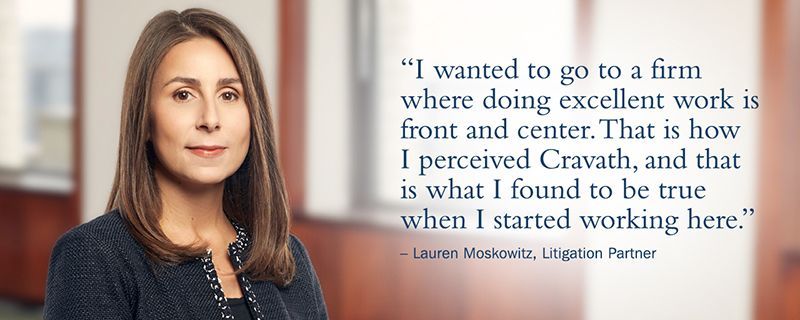
"I surprised myself by taking the LSAT and applying to law school—I was a math and economics major in college and had already accepted a job as an actuarial consultant but decided at the last minute to attend Fordham Law instead. I was not prepared in any way, shape or form for law school, but in my first year I fell in love with it. Moot Court was the most impactful part of my experience; I tried out after my 1L year and competed as a 2L and 3L.
I summered at another firm that follows a “free market” system, and after that summer I decided to apply to Cravath as a 3L. I gravitated toward Cravath’s rotation system partly because I did not want to have to compete with other people internally for work. And what was evident about Cravath was that I would not have to compete with anyone here—I just needed to work hard and do good work.
I wanted to go to a firm where doing excellent work is front and center. That is how I perceived Cravath, and that is what I found to be true when I started working here. Nobody cared where I went to school, who I knew or where I was from. You are evaluated only on the quality of your work. To this day, I value that part of our culture."
- Lauren Moskowitz, Litigation Partner
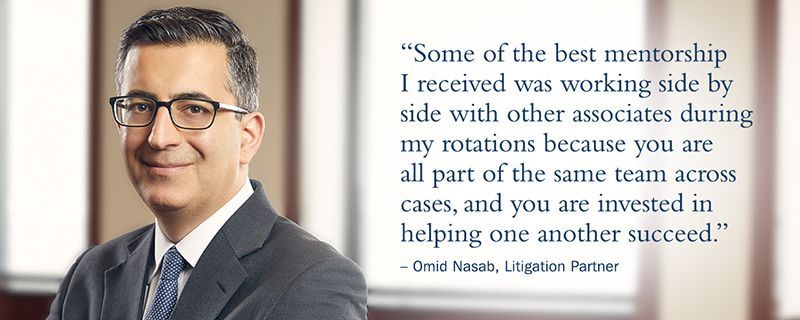
"I had the opportunity to summer at Cravath as well as a couple of other firms. One of the reasons I returned was because I saw the significant responsibilities young attorneys here were taking on. Even as a summer associate, I was able to work on a trial and receive direct feedback from my partner on witness books. And when I would ask Cravath junior associates about the work they were doing, I was surprised to learn how quickly associates received the opportunity to take depositions, lead interviews with witnesses, negotiate with opposing counsel and advise clients on bet-the-company, challenging matters. The Cravath associates were also working very closely with partners, not layers of other associates. Those things stood out to me when I thought about the sort of training and experiences I wanted as a young lawyer. At Cravath, you are given meaningful responsibility as soon as you can handle it, and you have very real opportunities to take ownership of your work. I could not have imagined a better environment in which to learn and grow."
- Omid Nasab, Litigation Partner
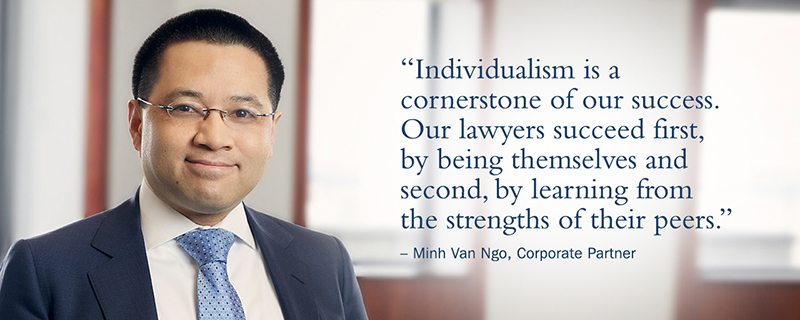
“I was born in Saigon, Vietnam, and grew up in Orange County, California. As a senior in high school and throughout my undergraduate years at Duke University, I worked as a consultant for a few start-up companies during the nascent stages of the Internet boom. This experience fueled my interest in corporate law, as I saw first-hand how corporate lawyers were instrumental in guiding clients through key strategic moments, such as initial financings, public offerings and mergers. More importantly, it convinced me that intelligence and hard work could overcome experience, and that young professionals could make a real difference. Going into my interview with Cravath, I was focused on how much responsibility I would be given as a young associate. While this concern was certainly addressed (as one partner put it to me, ‘The Firm doesn’t encourage associate responsibility, it depends on it.’), what ultimately sold me on Cravath, and very much surprised me, was the Firm’s focus on individualism. Every lawyer I met was very effective, but also very different. They each succeeded on their own terms. I had not thought at all about professional individualism during my interview process, but once I saw it at work, it made the idea of a long-term legal career click for me. To this day, one of the best parts of my job is continually working to make my career my own and watching and assisting other lawyers at Cravath do the same.”
- Minh Van Ngo, Corporate Partner
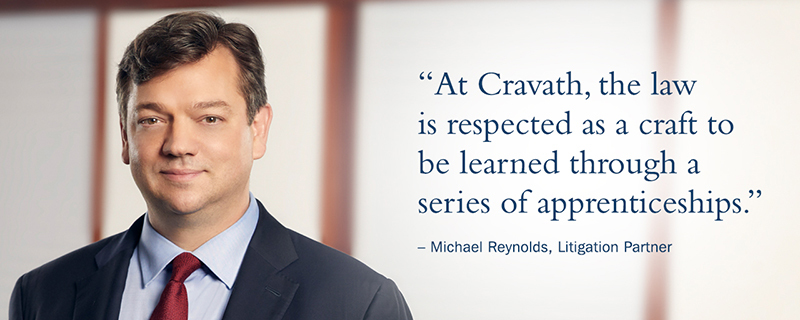
“Although I was born in New York City, I grew up in a suburb in Westchester County and began there what would ultimately become a journey back to New York City after a number of stops elsewhere. After college, I attended graduate school in England and studied medieval history, including medieval legal history and the origins of the English Court of Chancery in the fourteenth century. In law school, I fortunately also developed substantial interest in more modern aspects of the law. After clerking for a federal appeals court judge on the West Coast, I finally returned to New York City, where I began to work at Cravath. To me, Cravath was remarkable in its time-honored and unabashed commitment to excellence, combined with its embrace of the ideals of meritocracy. At Cravath, each associate is assigned to a partner for a rotation period, and each of the partners is committed to developing the skills of his or her associates. With small teams come increased responsibility and more opportunities to work directly with partners. As a result, partners have a well-developed sense of an associate’s progress and are able to direct associates to areas where improvement and further skill development can take place.”
- Michael Reynolds, Litigation Partner
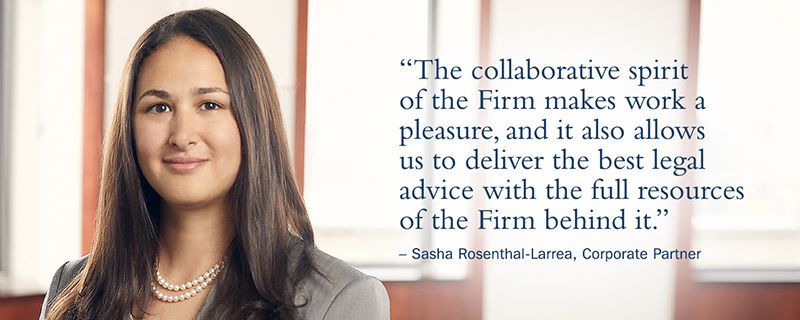
"I went into corporate work with a limited finance background. I had a degree in international relations from Brown and spent over a year working at the Inter-American Development Bank. It was one of my mentors there who suggested I go to law school, and it was during my 1L summer job at a prominent alternative asset manager that I was introduced to Cravath, while the legal team there was working with the Firm on a project. The in-house lawyers I was working with that summer spoke highly of the Firm, but I ultimately chose to come here because of what I learned through the interview process.
What I heard consistently was that Cravath really prioritizes the development of its attorneys, and that was important to me—being somewhere where what is valued most is hard work and creative thinking. It was also made clear that Cravath operates with a high degree of collaboration. I wanted to come to a place where people were working together, sounding out ideas, and where the structure of the Firm did not create incentive to compete internally."
- Sasha Rosenthal-Larrea, Corporate Partner
Cravath Bicentennial
Celebrating 200 years of partnership. In 2019, we celebrated our bicentennial. Our history mirrors that of our nation. Integral to our story is our culture.
Attorney Advertising. ©2025 Cravath, Swaine & Moore LLP.

